

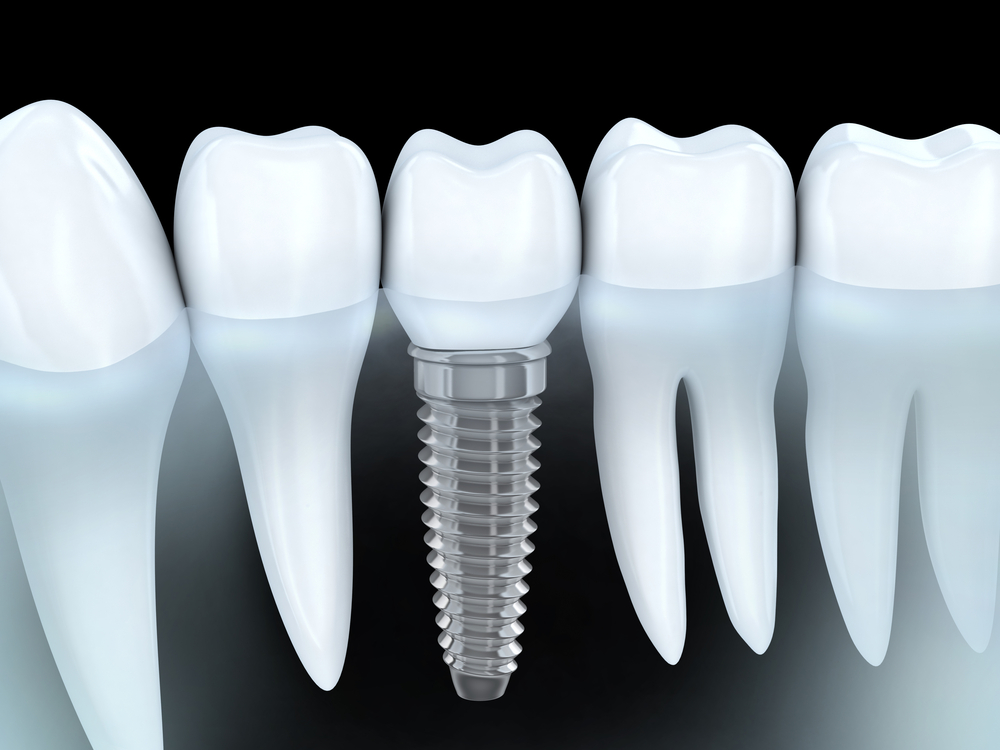
If you are concerned about missing teeth and your smile then dental implants may offer perfect solution. They can help give you the confidence to smile again. With recent technology breakthroughs the process of getting dental implants is not always complicated. Whether you have missing or damaged teeth, or want to improve the fit of your dentures, you consider getting dental implants.
What is a Dental Implant?
Dental implant is a prosthetic device that mimics your natural tooth root. It is fabricated with
biocompatible metal Titanium, it fuses to the jaw bone(osseointegration) over a period of time.
A restoration (crown /Bridge) is placed over it. If done well, it looks, feels and lasts like the real tooth it replaces.
The first step in getting a dental implant is consulting with your dentist. After a full examination, your dentist can determine if you are a suitable candidate for placement of dental implant. This initial consultation will include x-rays to look at the specific areas that will support an implant. If the dentist believes that there is enough room for an implant, the patient can move forward with the procedure. The attachment of a dental implant is a surgical procedure. It is attached directly to your jawbone. The recovery time for this surgery will vary, depending on the number of implants placed and type of surgery performed. .
Single Dental Implants
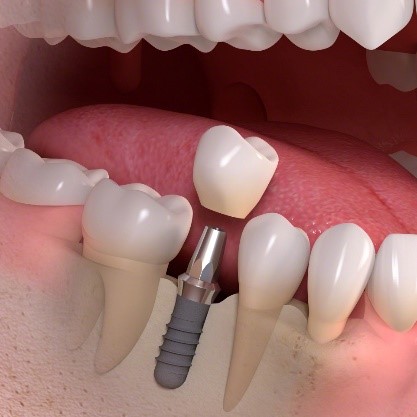
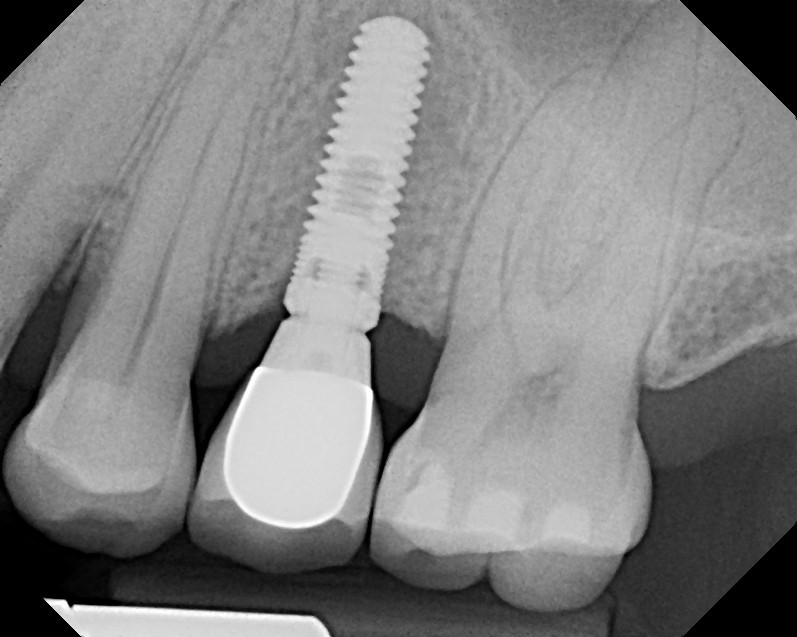
When you only need to replace a one tooth, a single dental implant is used. It is inserted into the jawbone. Once the implant fuses (Osseointegration) with the Jaw bone, your dentist will take a mold and fabricate a crown. The crown will be screwed (or) cemented on the implant accordingly.
Implant supported Bridges/ implant supported dentures
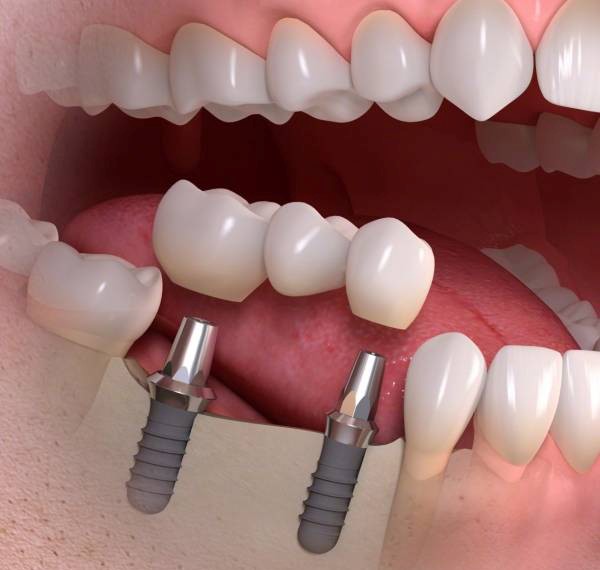
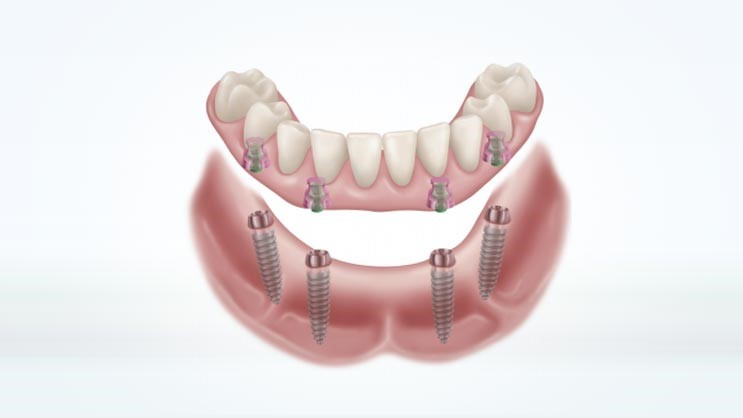
In the event that you need to replace multiple teeth, multiple dental implants can be used as stable foundation to secure dentures or bridges. This creates a more comfortable replacement for missing teeth.
All on Four and All on six:
All on four: The procedure is usually performed to fabricate a implant supported Mandibular denture. Your dentist can check the available bone and appropriate location for placement of four implants on which later your mandibular denture will be supported.
All on six: The procedure is usually performed to fabricate an implant supported Maxillary denture. Your dentist can check the available bone and appropriate location for placement of six implants on which later your maxillary denture will be supported.
How Much Do Dental Implants Cost?
The price of the dental implants will depend on the number of implants needed, and other specifics of the surgery. When you meet with your implant dentist, he or she should go over all the costs involved in the procedure.
If you have private health insurance, then a portion of the surgery may be covered. This will depend on the type of insurance and coverage that you have.
What Are the Benefits of Dental Implants?
There are numerous advantages of getting a implant supported restorations.
The main benefit is that the implant can help improve the appearance of your smile. It will feel like your own teeth and, because they are designed to fuse with your jawbone, they will become permanent.
Dental implants provide the following additional benefits:
They help you get your smile back so that you can feel better about yourself.
You will also find that it is easier to eat with Implant supported Dentures than with conventional dentures. Conventional Dentures can slide around, which can make it difficult to chew food. The use of dental implants can also improve your oral health. Single Implant placement is an excellent choice for replacement of single missing tooth, there is no need to reduce the size of other teeth, as you would need to do with dental bridges. Dental implants are durable, lasting for years. With proper care, you may even be able to keep your dental implants for life. They are convenient and comfortable, especially when compared to conventional dentures and dental bridges.
Who Should Consider Getting Dental Implants?
Your implant dentist will determine if you are a suitable candidate for dental implants. Your dentist will consider several factors when making this decision.
If you meet these conditions, then your dentist may agree to move forward with the procedure.
What is the Success Rate of Dental Implants?
The overall success rate of a dental is about 98% or higher. This is because it is a relatively simple procedure. Though, this can vary depending on the specifics of your situation. As always, your dentist will need to come up with a proper treatment plan based on your specific condition.
Are Dental Implants Painful?
While you may experience moderate discomfort immediately following the surgery, this will generally pass within a day or two. This is simply due to soreness around the site of the surgery. Your dentist will prescribe appropriate medication as needed after the surgery
Do Dental Implants Require Special Care?
Dental implants do not require any special care, other than regular dental check-ups. You will continue to follow proper oral hygiene habits, including proper brushing and flossing techniques. Your dentist will also likely recommend that you use an antibacterial mouthwash to help prevent infection.
Can You Use One Dental Implant to Replace Multiple Teeth?
No, you cannot use a single implant for multiple teeth. Each implant will has the ability to hold one crown. At least two implants are required to secure a short span partial bridge. To secure an upper or lower denture, typically four to six implants are used in each arch. Your dentist will evaluate the available bone with 2D and 3D radiographs and will inform how many implants are needed for adequate support.
Are There Any Potential Side Effects or Risks Involved?
As mentioned, dental implant procedures are common and relatively easy. But, there is always a potential for certain risks or side effects. This may include infection, nerve damage, or sinus problems – if the upper jaw implant reaches the sinus cavities. Infection can occur if bacteria enters the site of the surgery. Nerve damage is generally the result of the surgery and may require further work to repair.
How Long Will the Dental Implants Last?
The dental implants will generally last between 5 and 15 years, depending on your oral hygiene routine and general health. Though, some people can keep their implants for a lifetime. It really depends on how you care for your teeth.
Will the Dental Implant Surgery Hurt?
When the surgery is performed, anesthesia will be used .You will not experience any pain during the procedure. After the surgery, as the anesthesia begins to wear off, you may experience minor discomfort or pain. As mentioned, over-the-counter pain relievers can help treat these minor aches.
There may be minor bleeding near the surgery site. The stitches should dissolve within a week. In the event that they do come loose before this, then you might need to visit the dentist.
Any swelling that you experience should go away within one week. A cold compress may be used to help treat the swelling. Additionally, your head should be elevated while lying down.
Will Implants Help with Dentures?
As discussed, dental implants are sometimes used to support dentures. Traditional dentures rest against your gums. An adhesive may be used to provide stability. But, these dentures can still slide around. This can also lead to damage to the gums.
With dental implants for dentures, the dentures will not slip or slide. They are secured in place and most denture wearers prefer the stability that this provides.
Call us at (505)585-5157 (or) email at apexdentalnm@gmail.com, fill out a form on our website today to schedule a free consultation to discuss the options of getting dental implant supported crown. bridge and dentures.
Choose color style